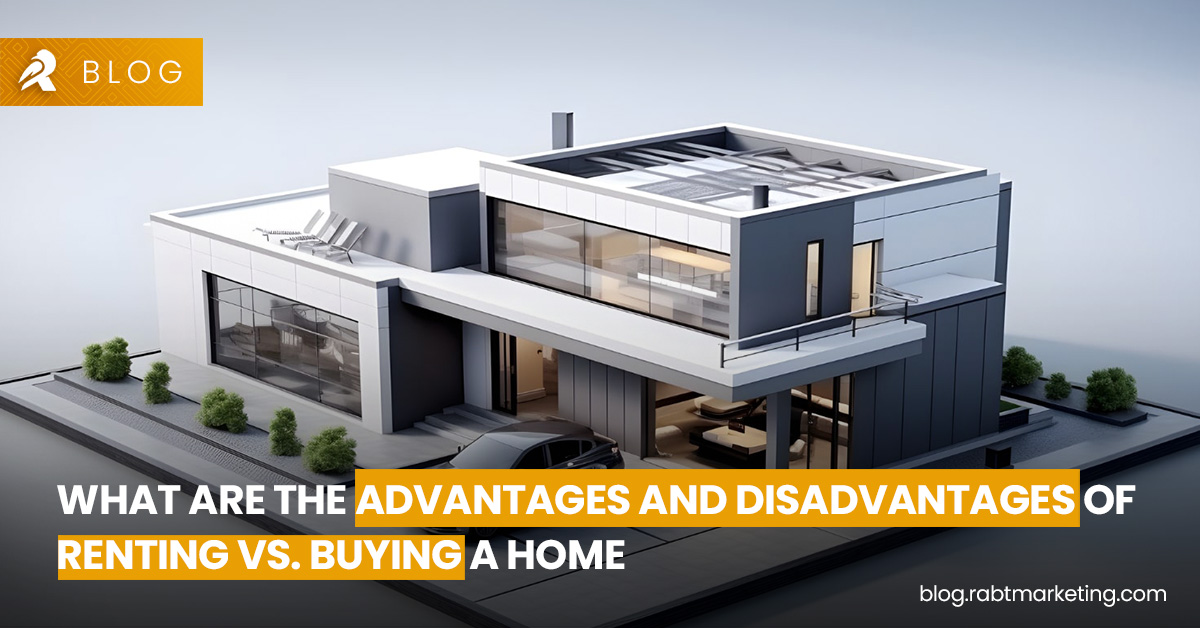Searching for a place to call home can feel like a significant challenge. Numerous thoughts race through your mind when confronted with this decision, and one of the initial queries you’re likely to consider is, “Should I invest in a home, or should I opt for renting?” Prior to taking the leap, it’s essential to discern which option aligns best with your circumstances and needs.
Although there are a number of factors to consider before finalizing a decision, the primary consideration that should guide your determination is your financial commitment. Both renting and purchasing have advantages and disadvantages. As a result, before making a decision, we recommend that you thoroughly research the benefits and drawbacks of renting and purchasing a home.
Renting

Firstly, we explore the pros and cons of renting a house.
Pros of Renting
Flexibility
One of the most significant advantages of renting is the flexibility it offers. Renting allows you to move without the burden of selling a property, making it ideal for those who have dynamic lifestyles or frequently changing job locations.
Lower Initial Costs
Renting typically requires a lower upfront cost. You won’t need to make a substantial down payment, which is common when buying a home. This makes renting more accessible for people with limited savings. As, renters don’t have to worry about maintenance and repair costs, which are the responsibility of the landlord. This can result in significant savings in the long run.
Less Maintenance Responsibilities
As a tenant, you’re not responsible for major maintenance or repairs. The landlord takes care of these issues, which can save you both time and money. This can result in significant savings in the long run.
Predictable Costs
Monthly rent payments make budgeting more predictable. You won’t have to worry about unexpected expenses, such as a broken water heater or roof repairs.
No Tax Payment
Tenants only have to worry about paying rent and utilities. The owner is the one who has to pay for things like home insurance and property taxes.
Amenities and Services
Many rental properties come with amenities like gyms, swimming pools, and security services. These can enhance your quality of life without additional costs.
Cons of Renting
Limited Control
As a tenant, you have limited control over the property. You can’t make significant alterations or renovations to the space to suit your preferences.
No Equity Building
Rent payments do not contribute to building equity in a property. You won’t benefit from potential property appreciation over time.
Rent Increases
Home owners can increase rent prices at the end of your lease, potentially making it more expensive to live in the same place. The owner can decide to increase the rent at any time without any notice. This can be an unexpected financial burden and can make it difficult to plan your budget.
Lack of Long-Term Stability
Renting doesn’t provide the long-term stability and security that homeownership can offer.
Buying a Home

Like any other thing, buying a home has its own advantages and disadvantages. We have to dive into the list of its positives and negatives for a better and more fruitful decision.
Pros of Buying a Home
Building Equity
When you buy a home, you’re building equity as you pay off your mortgage. This is like a forced savings account, as your home typically appreciates in value over time.
Stability and Control
You have control over your property, allowing you to make renovations and improvements as you see fit. You don’t have to worry about lease agreements.
Tax Benefits
Homeowners can benefit from various tax advantages, including deductions for mortgage interest and property taxes.
Potential for Rental Income
You can rent out part of your property to generate additional income, which can offset your mortgage costs.
Security and Long-Term Investment
Owning a home can provide a sense of security and is often considered a long-term investment in your financial future.
Cons of Buying a Home
High Initial Costs
When it comes to purchasing a home, a large down payment, closing charges, and continuing costs like property taxes and maintenance are all highly essential.
Lack of Flexibility
Homeownership ties you to a specific location. It can be challenging to relocate if you have to move for work or personal reasons.
Responsibility for Maintenance
As an owner, you are responsible for all maintenance and repairs, which can be expensive. You should factor in the cost of repairs and regular maintenance into your budget when relocating. It is important to research the area you’re moving to and understand the cost of living.
Market Fluctuations
The real estate market price value can change rapidly, and sometimes property values can go down tremendously, which can help cover your mortgage expenses.
Financial Risk
If you encounter financial difficulties, such as job loss, you risk foreclosure if you can’t make your mortgage payments.
Read More:- Top 10 Real Estate Developers in Pakistan
Conclusion
The decision to rent or buy a home is a personal one, influenced by your financial situation, lifestyle, and long-term goals. Each option has its pros and cons, and what might be right for one person may not be suitable for another. It’s important to consider your circumstances, your budget, and future plans when making this important choice. Weigh the advantages and disadvantages carefully, and, if possible, consult with a financial advisor or real estate expert to make an informed decision that aligns with your unique needs and aspirations.

